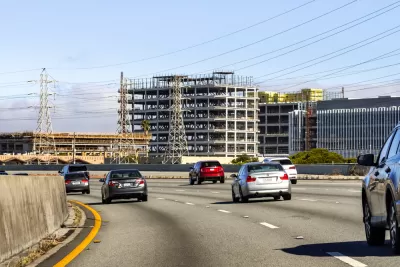The Regional Housing Needs Assessment drama continues in California.

[Updated, February 23, 2023]
San Francisco Bay Area jurisdictions’ failure to meet the standards required of the Regional Housing Needs Assessment (RHNA) process, as mandated by state law and enforced by regulators at the California Department of Housing and Community Development (HCD), has introduced a wave of new lawsuits.
As reported in February, 30 San Francisco Bay Area cities and counties submitted housing elements, out of 109 total jurisdictions, in time for the January 31 deadline. Of those 30, only four of those plans were approved by HCD, according to figures reported by Globe St., though not everyone agrees on those totals. According to John Goodwin, a representative for the Association of Bay Area Governments, more than 90 of the Bay Area’s 109 local jurisdictions had at least submitted a first draft of their housing element to HCD by the deadline. The failure of the Bay Area’s local jurisdictions in meeting the deadlines, to whatever degree, comes months after they saw Southern California cities suffer the consequences of inaction at an earlier deadline.
The lawsuits quickly followed the abdication of RHNA responsibility, according to a column by Emily Hoeven for the San Francisco Chronicle. Three pro-housing legal nonprofits—YIMBY Law, the California Housing Defense Fund and Californians for Homeownership—filed a total of 12 lawsuits, according to Hoeven: “The three groups are suing Belvedere, Burlingame, Cupertino, Daly City, Fairfax, Martinez, Novato, Palo Alto, Pinole, Pleasant Hill, Richmond and Santa Clara County for failing to follow state law.”
“Most of the local governments targeted by these lawsuits didn’t adopt plans at all, the groups’ legal counsel told me, while others gave the illusion of compliance by greenlighting their own blueprints, even though these plans hadn’t been reviewed by the state Department of Housing and Community Development,” adds Hoeven.
The builder’s remedy, which allows developers to bypass local control of zoning laws, creates a powerful disincentive for cities and counties to fail RHNA compliance, but the YIMBY groups intend for these lawsuits as an extra spur for local governments to act.
[This article was updated to remove a reference to housing construction in Burlingame from the photo caption.]
FULL STORY: YIMBYs are about to sue the daylights out of cities across the Bay Area. Here’s why

Planetizen Federal Action Tracker
A weekly monitor of how Trump’s orders and actions are impacting planners and planning in America.

Chicago’s Ghost Rails
Just beneath the surface of the modern city lie the remnants of its expansive early 20th-century streetcar system.

San Antonio and Austin are Fusing Into one Massive Megaregion
The region spanning the two central Texas cities is growing fast, posing challenges for local infrastructure and water supplies.

Since Zion's Shuttles Went Electric “The Smog is Gone”
Visitors to Zion National Park can enjoy the canyon via the nation’s first fully electric park shuttle system.

Trump Distributing DOT Safety Funds at 1/10 Rate of Biden
Funds for Safe Streets and other transportation safety and equity programs are being held up by administrative reviews and conflicts with the Trump administration’s priorities.

German Cities Subsidize Taxis for Women Amid Wave of Violence
Free or low-cost taxi rides can help women navigate cities more safely, but critics say the programs don't address the root causes of violence against women.
Urban Design for Planners 1: Software Tools
This six-course series explores essential urban design concepts using open source software and equips planners with the tools they need to participate fully in the urban design process.
Planning for Universal Design
Learn the tools for implementing Universal Design in planning regulations.
planning NEXT
Appalachian Highlands Housing Partners
Mpact (founded as Rail~Volution)
City of Camden Redevelopment Agency
City of Astoria
City of Portland
City of Laramie





























